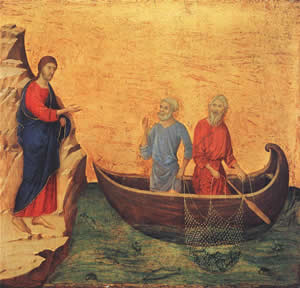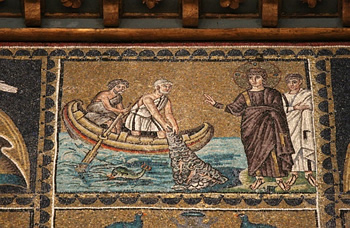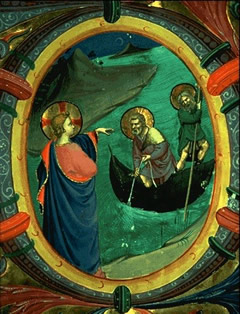For Sunday January 22, 2023
Lectionary Readings (Revised Common Lectionary, Year A)
Isaiah 9:1–4
Psalm 27:1, 4–9
1 Corinthians 1:10–18
Matthew 4:12–23
On January 6 the church began the brief season of Epiphany — just six Sundays after Advent and before Lent. With historical precedents that began in the fourth century, the word "epiphany" comes from a transliteration of the Greek epiphaneia, meaning manifestation, unveiling, or disclosure.
The historical fact of Jesus' birth that we recently celebrated is one thing. But what are its ramifications? What did it signal or mean? What did his birth reveal, disclose, manifest or unveil about God and the world?
In short, the birth of Jesus discloses the dream of God. He unveils and reveals the heart of God for all the world, and, indeed, for the entire cosmos. Paul calls it a mystery that has been made known. We invoke this divine dream every time that we pray that God's will be done "on earth as it is in heaven." This dream of God is for the here and now, not the far off future.
Dreams and visions loom large throughout the Bible. In Genesis there are the dreams of Pharaoh, Jacob, and Joseph. In the last book of the Bible, Revelation, John dreams the craziest of apocalyptic dreams. The stories of Esther and Ruth revolve around dreams. Peter had a life-changing dream about accepting Gentiles. Paul had a dream about God's call to Macedonia.
Isaiah 9 for this week imagines people who stumble in the darkness living in the light. In Matthew's gospel, the birth of Jesus revolves around five dreams that culminate when Jesus proclaims God's dream for us all — the kingdom of God is at hand! Don't wait, he says. Repent, believe, and live this dream today!
 |
|
Duccio di Buoninsegna, The Calling of Peter
and Andrew, 1308-11, Tempera on wood panel. |
What does this dream look like in reality, when we awake from our slumber and darkness, and live in the light of God? There's a little phrase that I've always loved in the Letter to Diognetus (c. 130 AD) that captures what living God's dream looks like. He calls it "the wonderful and confessedly striking method of life" of the early believers.
They were known for their social generosity. Care for the weak instead of privileges for the powerful. Dignity instead of vulgarity. Love instead of hate. Peace instead of violence. Inclusion rather than exclusion. Generosity rather than greed. Doing justice and loving kindness.
About the same time as Diognetus, Justin Martyr (c. 100–165) summarized the appeal of the Christian dream: “Those who once delighted in fornication now embrace chastity alone… we who once took most pleasure in accumulating wealth and property now share with everyone in need; we who hated and killed one another and would not associate with people of different tribes because of their different customs now, since the coming of Christ, live familiarly with them and pray for our enemies.”
The gospel for this week "unveils" God's dream that was made manifest in Jesus. Matthew writes that "Jesus began to preach, 'Repent, for the kingdom of heaven is near'" (4:17). Those are the exact words that the wild and wooly John the Baptizer preached in the parched desert of Judea and at the shores of the Jordan River (3:1). In Mark's parallel account they're also the very first words spoken by Jesus (1:15).
Daring to dream begins with changing directions.
To repent is not to feel bad, but to think differently. To repent doesn't mean to grovel in self-hatred or pious sorrow. When we repent we turn around, change directions, choose a different path, or make a radical rupture. Repentance signals an abrupt end to life on auto-pilot or to business as usual.
 |
|
Christ calls Peter and Andrew. Mosaic in Sant'Apollinare Nuovo, Ravenna, c. 500.
|
Whereas we often construe repentance as a religious word with negative connotations, radical change is exactly what most of us long for. It's something entirely positive. The gospel says that "large crowds" flocked to Jesus and his message of repentance. That's also what happened with John's "baptism of repentance."
When Jesus saw Peter and Andrew fishing in the Sea of Galilee, he invited them, "Come, follow me." Matthew and Mark dramatize their unequivocal response: "At once they left their nets and followed him." Jesus then saw James and John fishing with their father Zebedee, and likewise called them. "They immediately left the boat and their father and followed him." Speaking for the twelve apostles, Peter could even say to Jesus, "We have left everything to follow you!" (Mark 10:28).
"At once," "immediately," and "everything." Why such urgency and abandonment? Why not go home and weigh the pros and cons with your family? Won't friends think we're crazy, impulsive, even irresponsible? Won't you regret such a categorical decision? Why burn your bridges when you could hedge your bet? In the epistle this week Paul admits that from a human perspective the call of Jesus to repentance is both "foolish" and "scandalous" (1 Corinthians 1:18, 23).
Jesus invited Peter, Andrew, James and John to a radical reorientation, because in his own person "the kingdom of God has arrived." Jesus both announced and embodied God's reign on earth, right here and right now. There was an unmistakable element of cosmic fulfillment in his preaching, teaching, and healing: "The kairos has come. The kingdom of God is at hand. Repent and believe the good news!" The divine dream has come to earth, right now. Awaken from your slumber and darkness.
The Greek word kairos denotes a critical juncture, a divine intervention, or a special moment, in contrast to mere chronos or everyday clock time. You mark chronos on your calendar, like the soccer game on Tuesday at 4:00 PM. With chronos you might procrastinate and suffer some minimal consequences.
Kairos is different. Because kairos denotes a unique opportunity, it invites a radical response, an urgent choice, or a fundamental reorientation. Peter, Andrew, James and John sensed God's kairos, and so they left everything at once to follow Jesus — their father, the hired help, the boat, their nets, their livelihoods, everything that was safe, predictable and familiar.
 |
|
The Calling of Peter and Andrew by Fra Angelico, c. 1430.
|
In stark contrast, Jesus lamented that Jerusalem “did not recognize the kairos of God's coming to you” (Luke 19:44). It's one thing, he warned, to predict the signs of the seasons or the patterns of the weather, but quite another to recognize and act upon the "signs of the kairos" (Matthew 16:3).
The smug and secure establishment people often rejected Jesus' invitation, didn't believe it, or chose not to hear. A wealthy businessman, for example "went away sad" when Jesus invited him to "Come, follow me" (Mark 10:22). The pagan Ninevites, on the other hand, understood the kairos of God. Much to Jonah's shock and chagrin, those "foreigners" responded to his preaching, repented, and believed his message about Yahweh.
Throughout the Bible, peripheral outsiders who have been marginalized by mainstream insiders respond to Jesus's urgent invitation — the religiously suspect, the ethnic enemy, social outcasts, the economically poor, and the morally impure. Matthew describes the"large crowds" who followed Jesus as people "who were ill with various diseases, those suffering severe pain, the demon-possessed, the epileptics and the paralytics" (Matthew 4:24). In the words of Isaiah's poetry for this week, quoted by Matthew, they were people stumbling in darkness who were longing for the light.
Jesus' call to repentance is an invitation to healing. It asks God to end all that is old in us and to begin something new. The weak and the weary who know their deep needs and respond to this message have much to teach the strong and the powerful. A favorite prayer of mine from Arsenios (5th century) helps us to begin a new beginning: "My God, do not abandon me. I have done nothing good before Thee, but grant me, in Thy compassion, the power to make a start."
Where there is no vision, no dreams, says Proverbs 29:18, the people perish. In his famous poem "Dreams," Langston Hughes (1902–1967), the African-American poet, novelist, playwright, and newspaper columnist, urged us not to forfeit our dreams.
Hold fast to dreams
For if dreams die
Life is a broken-winged bird
That cannot fly.
Hold fast to dreams
For when dreams go
Life is a barren field
Frozen with snow.
So, live the dream of God. Unveil the meaning of Jesus. Hear what the Spirit is saying to God's people. Disclose that "wonderful and confessedly striking method of life" that Jesus called us to when he said that the reign and rule of God has begun. May it be on earth, right here and right now, as it is in heaven.
Weekly Prayer
William Cowper (1731–1800)
The Lord will happiness divine
On contrite hearts bestow;
Then tell me, gracious God, is mine
A contrite heart or no?I hear, but seem to hear in vain,
Insensible as steel;
If aught is felt, 'tis only pain,
To find I cannot feel.I sometimes think myself inclined
To love Thee if I could;
But often feel another mind,
Averse to all that's good.My best desires are faint and few,
I fain would strive for more;
But when I cry, "My strength renew!"
Seem weaker than before.Thy saints are comforted, I know,
And love Thy house of prayer;
I therefore go where others go,
But find no comfort there.Oh make this heart rejoice or ache;
Decide this doubt for me;
And if it be not broken, break—
And heal it, if it be.Taken from Jay Hopler and Kimberly Johnson, editors, Before the Door of God; An Anthology of Devotional Poetry (New Haven: Yale University Press, 2013). William Cowper was an Anglican poet and hymn writer. He struggled throughout his life with severe mental illness, including depression, insanity, and several attempts of suicide.
Dan Clendenin: dan@journeywithjesus.net
Image credits: (1) MagicStatistics.com; (2) Sacred-Destination.com; and (3) ArtBible.info.





